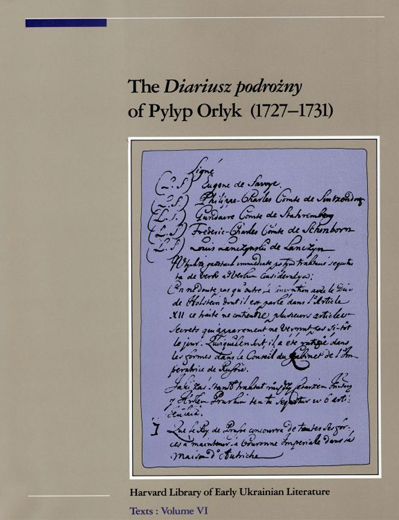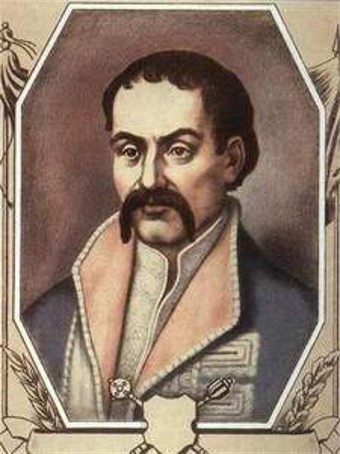Orlyk, Pylyp
Orlyk, Pylyp [Орлик, Пилип], b 11 October 1672 in Kosuta, Ashmiany county, Wilno (Vilnius) voivodeship, Lithuania, d 26 May 1742 in Iaşi, Moldavia. Cossack statesman and hetman-in-exile; father of Hryhor Orlyk. A nobleman of Bohemian ancestry, he studied at the Jesuit college in Vilnius and until 1694 at the Kyivan Mohyla College. In 1698 he was appointed secretary of the consistory of Kyiv metropoly. In 1699, after marrying Anna, the daughter of Col P. Hertsyk of Poltava regiment, he became a senior member of the Hetman state's General Military Chancellery. In 1706 Hetman Ivan Mazepa appointed Orlyk general chancellor. In that capacity he was Mazepa's closest aide, facilitated Mazepa's secret correspondence with the Poles and Swedes, and assisted Mazepa in his efforts to form an anti-Russian coalition in Eastern Europe. After the defeat at the Battle of Poltava in July 1709, Orlyk fled abroad with Mazepa and became a leader of the first Ukrainian political emigration.
After Mazepa's death, on 16 April 1710, Orlyk was elected hetman, with the backing of Charles XII of Sweden, in Bendery. The chief author of the Constitution of Bendery, he pursued policies aimed at liberating Ukraine from Russian rule. He gained the support of the Zaporozhian Host, concluded a treaty with Charles XII in May 1710, and sought to make the Ukrainian question a matter of international concern by continuing Mazepa's attempts at establishing an anti-Russian coalition. Orlyk signed a treaty with the Crimean khan Devlet-Girei in February 1711, negotiated with the Ottoman Porte, which formally recognized his authority over Right-Bank Ukraine and the Zaporizhia in 1712, conducted talks with the Don Cossack participants in Kondratii Bulavin's revolt who had fled to the Kuban, and even contacted the Kazan Tatars and the Bashkirs. In 1711–14 he led Cossack campaigns against the Russians in Right-Bank Ukraine. Despite initial victories they ultimately failed, because of Turkish vacillation and because the pillaging, raping, and taking of many civilian captives by Orlyk's Crimean Tatar allies resulted in the loss of public and military support on the Right Bank.
Orlyk and a part of his General Officer Staff emigrated in 1714 to Sweden, in 1720 to Silesia, and in 1721 to Poland. From 1722 until his death he was interned in Turkish-controlled territories—in Salonika until 1734, then in the Budzhak, and finally in Moldavia. During that period Orlyk sought, in vain, the support of Sweden, Poland, Saxony, Great Britain, Hannover, Holstein, the Vatican, and, through his son, Hryhor Orlyk, France. He also continued trying to organize, without success, a personal army and to incite the Zaporozhian Host to rise against Russian rule.
Orlyk wrote verses in Latin, the panegyrics Alcides Rossyiski (The Russian Alcides [Heracles], 1695) to Mazepa and Hippomenes Sarmacki (The Sarmatian Hippomenes, 1698) to Col Ivan Obydovsky, the political treatise ‘Vyvid prav Ukraïny' (Devolution of Ukraine's Rights, 1712), a manifesto to European governments justifying his alliance with the Porte (1712), and numerous memorandums to European rulers and government leaders. His diary of 1720–32 (5 vols) is preserved at the Archives of the Ministry of Foreign Affairs in Paris. A book of Orlyk’s selected works, edited by Myroslav Trofymuk and Valerii Shevchuk, was published in Kyiv in 2006.
BIBLIOGRAPHY
[Rawita-]Gawroński, F. ‘Filip Orlyk, nieuznany hetman kozacki,’ in Studya i szkice historyczne, ser 2 (Lviv 1900)
Holiichuk, F. ‘Fylyp Orlyk u Halychyni,’ in Naukovyi zbirnyk prysviachenyi M. Hrushevs’komu (Lviv 1906)
Iensen [Jensen], A. ‘Orlyk u Shvetsiï,’ ZNTSh, 92 (1909)
Kordt, V.A. (ed). ‘Dokumenty ob Andree Voinarovskom i Filippe Orlike,’ Sbornik statei i materialov po istorii Iugo-Zapadnoi Rossii, 2 (Kyiv 1916)
Borshchak, I. ‘Het’man Pylyp Orlyk i Frantsiia (storinky dyplomatychnoï istoriï),’ ZNTSh, 134–5 (1924); repr UIZh, 1991, nos 8–9, 11
Krupnyts’kyi, B. Het’man Pylyp Orlyk (1672–1742): Ohliad ioho politychnoï diial’nosty (Warsaw 1938)
Borschak, E. ‘Pylyp Orlyk's Devolution of the Ukraine's Rights,’ AUA, 6, nos 3–4 (1958)
Subtelny, O. The Mazepists: Ukrainian Separatism in the Early Eighteenth Century (New York 1981)
The Diariusz podrożny of Pylyp Orlyk (1727–1731), intro by Omeljan Pritsak (Cambridge, Mass 1988)
Iakovenko, Nataliia (ed.). Pylyp Orlyk: zhyttia, polityka, teksty (Kyiv 2011)
Häggman, Bertil. Hetman Filip Orlik – en ukrainsk frihetskaempe i Sverige 1715–1720 (Kristianstad 2014)
Theodore Mackiw
[This article was updated in 2014.]


.jpg)
.jpg)
